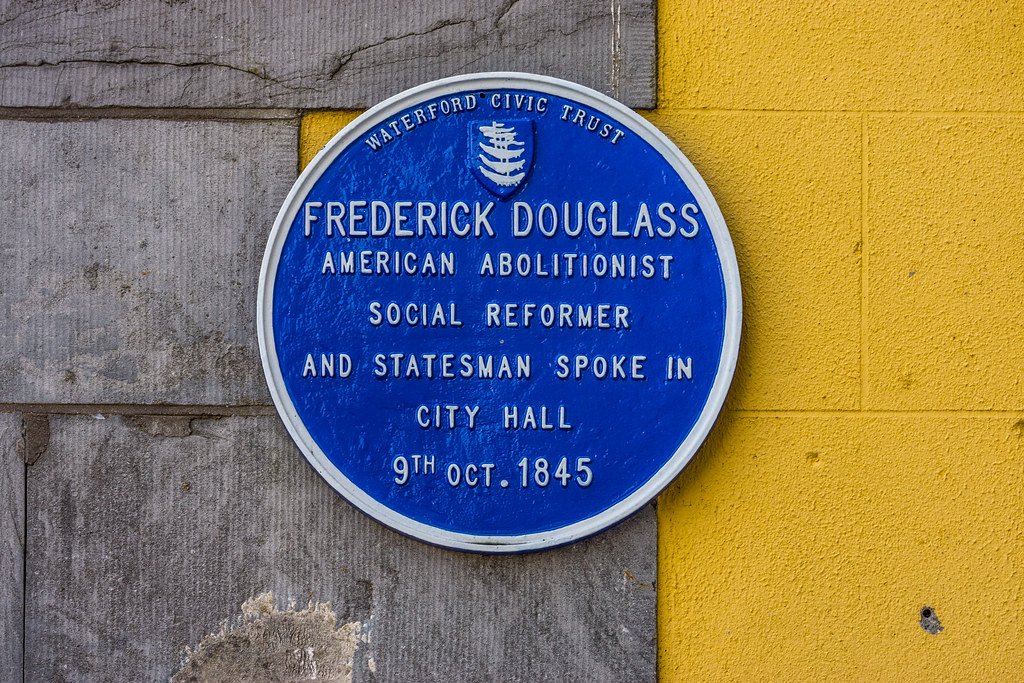FREDERICK DOUGLASS SPOKE IN CITY HALL - MEMORIAL PLAQUE IN WATERFORD
Frederick Douglass (born Frederick Augustus Washington Bailey, c. February 1818 – February 20, 1895) was an African-American social reformer, abolitionist, orator, writer, and statesman.
After escaping from slavery in Maryland, he became a national leader of the abolitionist movement from Massachusetts and New York, gaining note for his dazzling oratory and incisive antislavery writings.
In his time he was described by abolitionists as a living counter-example to slaveholders' arguments that slaves lacked the intellectual capacity to function as independent American citizens. Northerners at the time found it hard to believe that such a great orator had once been a slave.
Douglass' friends and mentors feared that publicity would draw the attention of his ex-owner, Hugh Auld, who might try to get his "property" back. They encouraged Douglass to tour Ireland, as many former slaves had done. Douglass set sail on the Cambria for Liverpool on August 16, 1845. He traveled in Ireland as the Irish Potato Famine was beginning.
The feeling of freedom from American racial discrimination amazed Douglass:
Eleven days and a half gone and I have crossed three thousand miles of the perilous deep. Instead of a democratic government, I am under a monarchical government. Instead of the bright, blue sky of America, I am covered with the soft, grey fog of the Emerald Isle [Ireland]. I breathe, and lo! the chattel [slave] becomes a man. I gaze around in vain for one who will question my equal humanity, claim me as his slave, or offer me an insult. I employ a cab—I am seated beside white people—I reach the hotel—I enter the same door—I am shown into the same parlour—I dine at the same table—and no one is offended... I find myself regarded and treated at every turn with the kindness and deference paid to white people. When I go to church, I am met by no upturned nose and scornful lip to tell me, 'We don't allow niggers in here!'
He also met and befriended the Irish nationalist Daniel O'Connell who was to be a great inspiration.
After escaping from slavery in Maryland, he became a national leader of the abolitionist movement from Massachusetts and New York, gaining note for his dazzling oratory and incisive antislavery writings.
In his time he was described by abolitionists as a living counter-example to slaveholders' arguments that slaves lacked the intellectual capacity to function as independent American citizens. Northerners at the time found it hard to believe that such a great orator had once been a slave.
Douglass' friends and mentors feared that publicity would draw the attention of his ex-owner, Hugh Auld, who might try to get his "property" back. They encouraged Douglass to tour Ireland, as many former slaves had done. Douglass set sail on the Cambria for Liverpool on August 16, 1845. He traveled in Ireland as the Irish Potato Famine was beginning.
The feeling of freedom from American racial discrimination amazed Douglass:
Eleven days and a half gone and I have crossed three thousand miles of the perilous deep. Instead of a democratic government, I am under a monarchical government. Instead of the bright, blue sky of America, I am covered with the soft, grey fog of the Emerald Isle [Ireland]. I breathe, and lo! the chattel [slave] becomes a man. I gaze around in vain for one who will question my equal humanity, claim me as his slave, or offer me an insult. I employ a cab—I am seated beside white people—I reach the hotel—I enter the same door—I am shown into the same parlour—I dine at the same table—and no one is offended... I find myself regarded and treated at every turn with the kindness and deference paid to white people. When I go to church, I am met by no upturned nose and scornful lip to tell me, 'We don't allow niggers in here!'
He also met and befriended the Irish nationalist Daniel O'Connell who was to be a great inspiration.
SORRY FOR THE DELAY
